Analyzing Revenue Management & HR Life Cycle in Travel & Tourism
VerifiedAdded on 2023/01/18
|19
|4872
|59
Report
AI Summary
This report provides an analysis of revenue management and HR practices within the travel and tourism industry, focusing on British Airways as a case study. It covers key principles of revenue management such as pricing, demand forecasting, and market segmentation, and evaluates various revenue management tools including discount allocation, capacity utilization, and late booking strategies. The report also examines the impact of differentiated pricing strategies on revenue management and outlines the stages of the HR life cycle in the context of a revenue manager role, including recruitment, education, motivation, evaluation, and celebration. Furthermore, it emphasizes the importance of retaining and developing talent within the organization. The report concludes by touching upon the significance of ethical considerations and legal compliance in the travel and tourism sector.
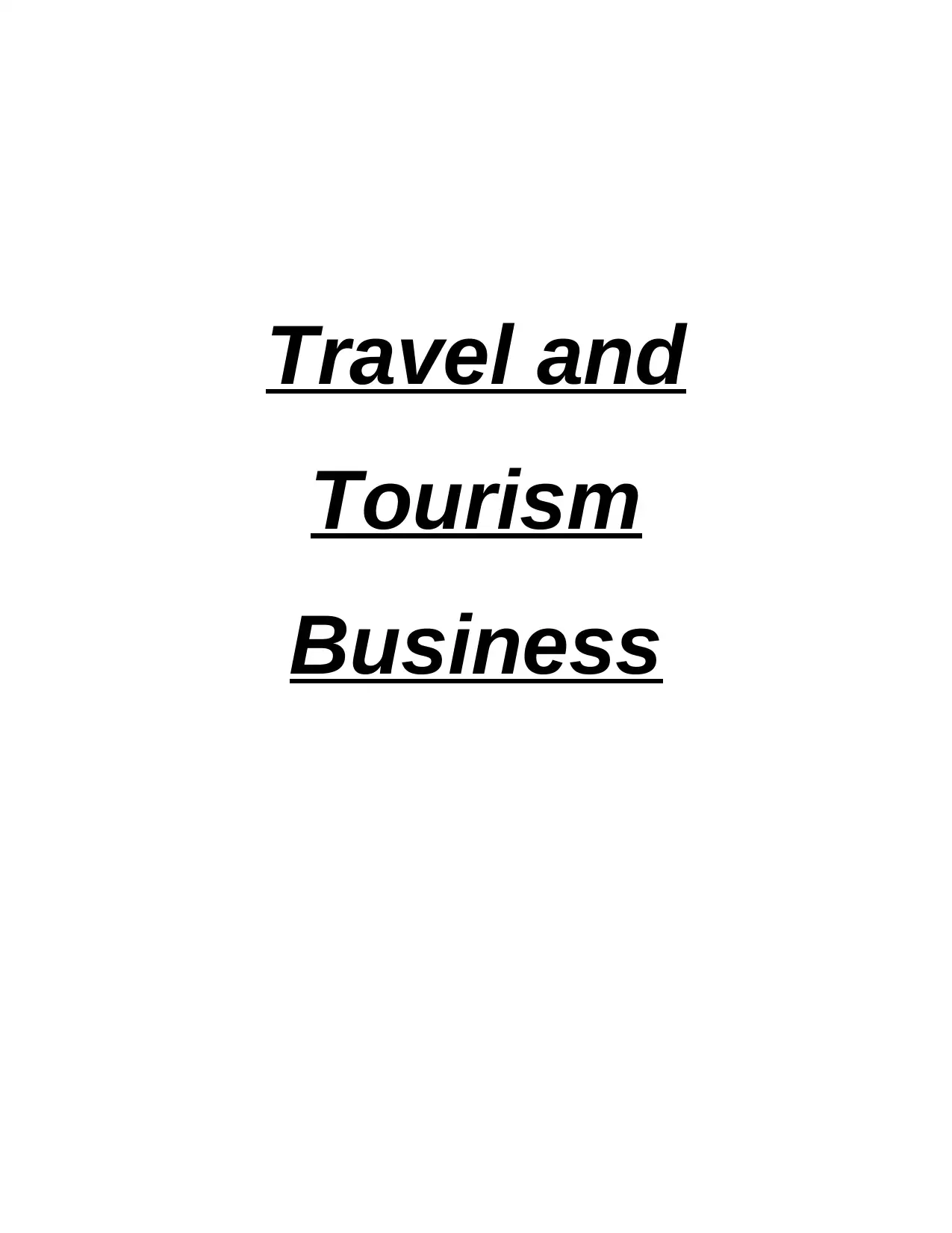
Travel and
Tourism
Business
Tourism
Business
Paraphrase This Document
Need a fresh take? Get an instant paraphrase of this document with our AI Paraphraser
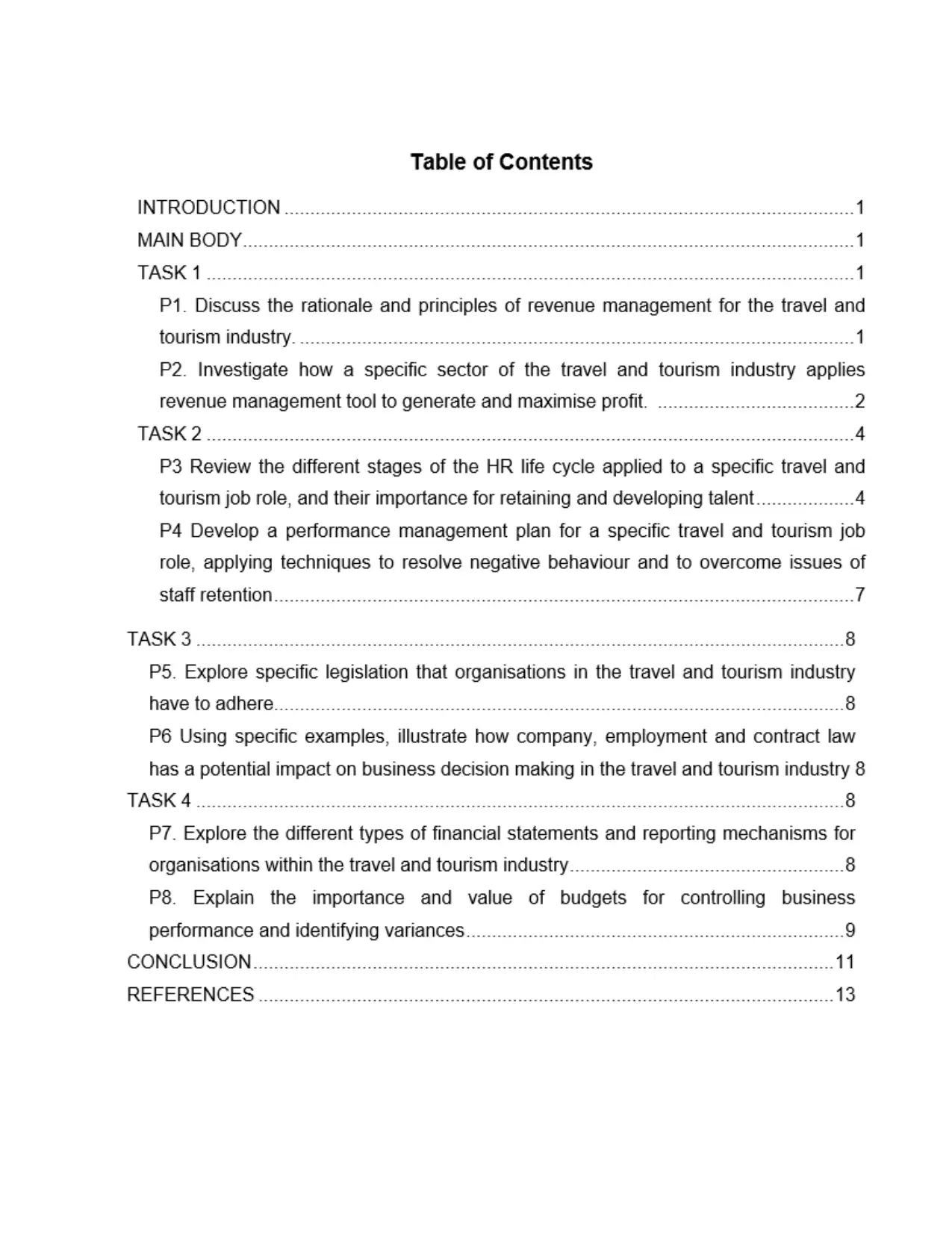
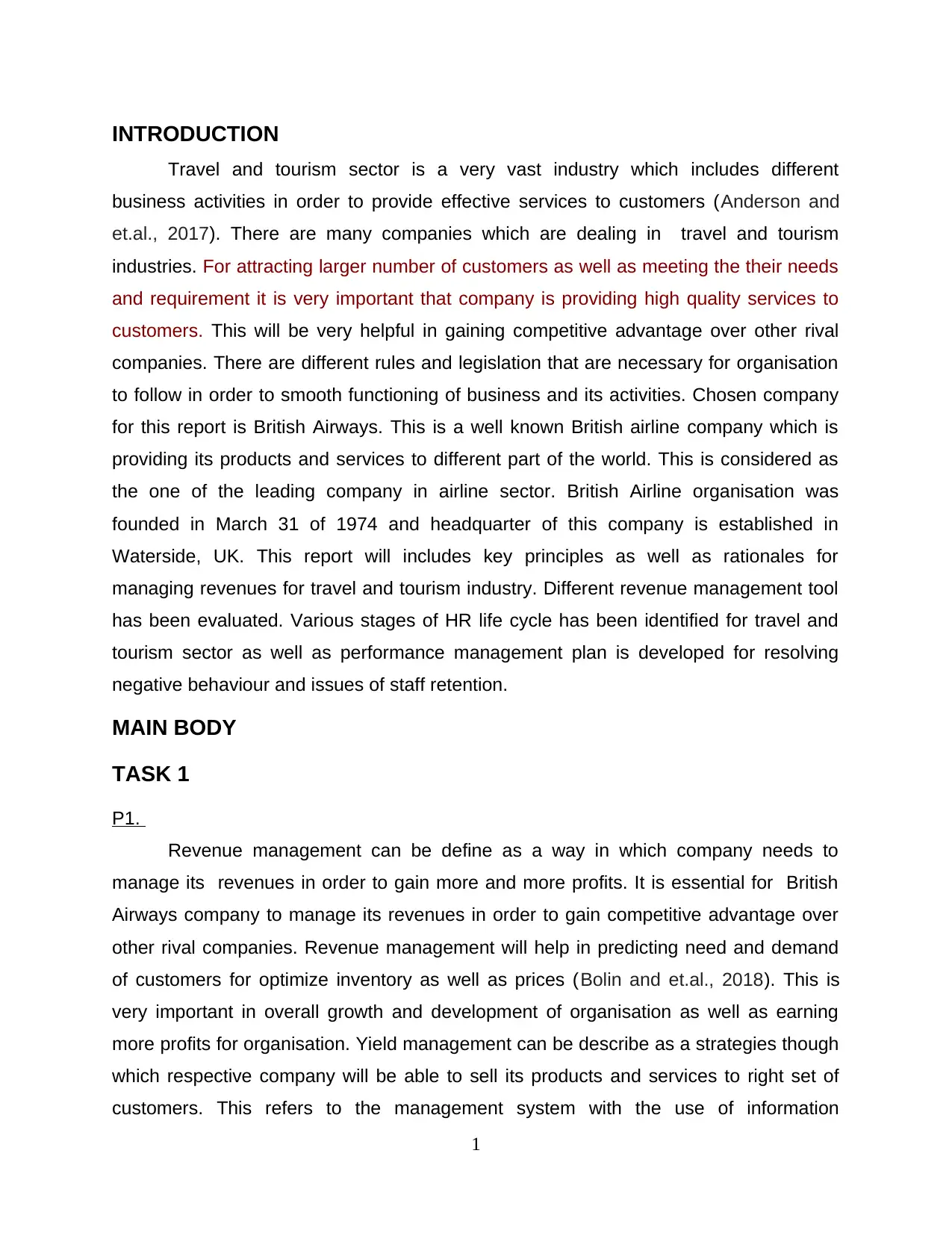
INTRODUCTION
Travel and tourism sector is a very vast industry which includes different
business activities in order to provide effective services to customers (Anderson and
et.al., 2017). There are many companies which are dealing in travel and tourism
industries. For attracting larger number of customers as well as meeting the their needs
and requirement it is very important that company is providing high quality services to
customers. This will be very helpful in gaining competitive advantage over other rival
companies. There are different rules and legislation that are necessary for organisation
to follow in order to smooth functioning of business and its activities. Chosen company
for this report is British Airways. This is a well known British airline company which is
providing its products and services to different part of the world. This is considered as
the one of the leading company in airline sector. British Airline organisation was
founded in March 31 of 1974 and headquarter of this company is established in
Waterside, UK. This report will includes key principles as well as rationales for
managing revenues for travel and tourism industry. Different revenue management tool
has been evaluated. Various stages of HR life cycle has been identified for travel and
tourism sector as well as performance management plan is developed for resolving
negative behaviour and issues of staff retention.
MAIN BODY
TASK 1
P1.
Revenue management can be define as a way in which company needs to
manage its revenues in order to gain more and more profits. It is essential for British
Airways company to manage its revenues in order to gain competitive advantage over
other rival companies. Revenue management will help in predicting need and demand
of customers for optimize inventory as well as prices (Bolin and et.al., 2018). This is
very important in overall growth and development of organisation as well as earning
more profits for organisation. Yield management can be describe as a strategies though
which respective company will be able to sell its products and services to right set of
customers. This refers to the management system with the use of information
1
Travel and tourism sector is a very vast industry which includes different
business activities in order to provide effective services to customers (Anderson and
et.al., 2017). There are many companies which are dealing in travel and tourism
industries. For attracting larger number of customers as well as meeting the their needs
and requirement it is very important that company is providing high quality services to
customers. This will be very helpful in gaining competitive advantage over other rival
companies. There are different rules and legislation that are necessary for organisation
to follow in order to smooth functioning of business and its activities. Chosen company
for this report is British Airways. This is a well known British airline company which is
providing its products and services to different part of the world. This is considered as
the one of the leading company in airline sector. British Airline organisation was
founded in March 31 of 1974 and headquarter of this company is established in
Waterside, UK. This report will includes key principles as well as rationales for
managing revenues for travel and tourism industry. Different revenue management tool
has been evaluated. Various stages of HR life cycle has been identified for travel and
tourism sector as well as performance management plan is developed for resolving
negative behaviour and issues of staff retention.
MAIN BODY
TASK 1
P1.
Revenue management can be define as a way in which company needs to
manage its revenues in order to gain more and more profits. It is essential for British
Airways company to manage its revenues in order to gain competitive advantage over
other rival companies. Revenue management will help in predicting need and demand
of customers for optimize inventory as well as prices (Bolin and et.al., 2018). This is
very important in overall growth and development of organisation as well as earning
more profits for organisation. Yield management can be describe as a strategies though
which respective company will be able to sell its products and services to right set of
customers. This refers to the management system with the use of information
1
⊘ This is a preview!⊘
Do you want full access?
Subscribe today to unlock all pages.

Trusted by 1+ million students worldwide
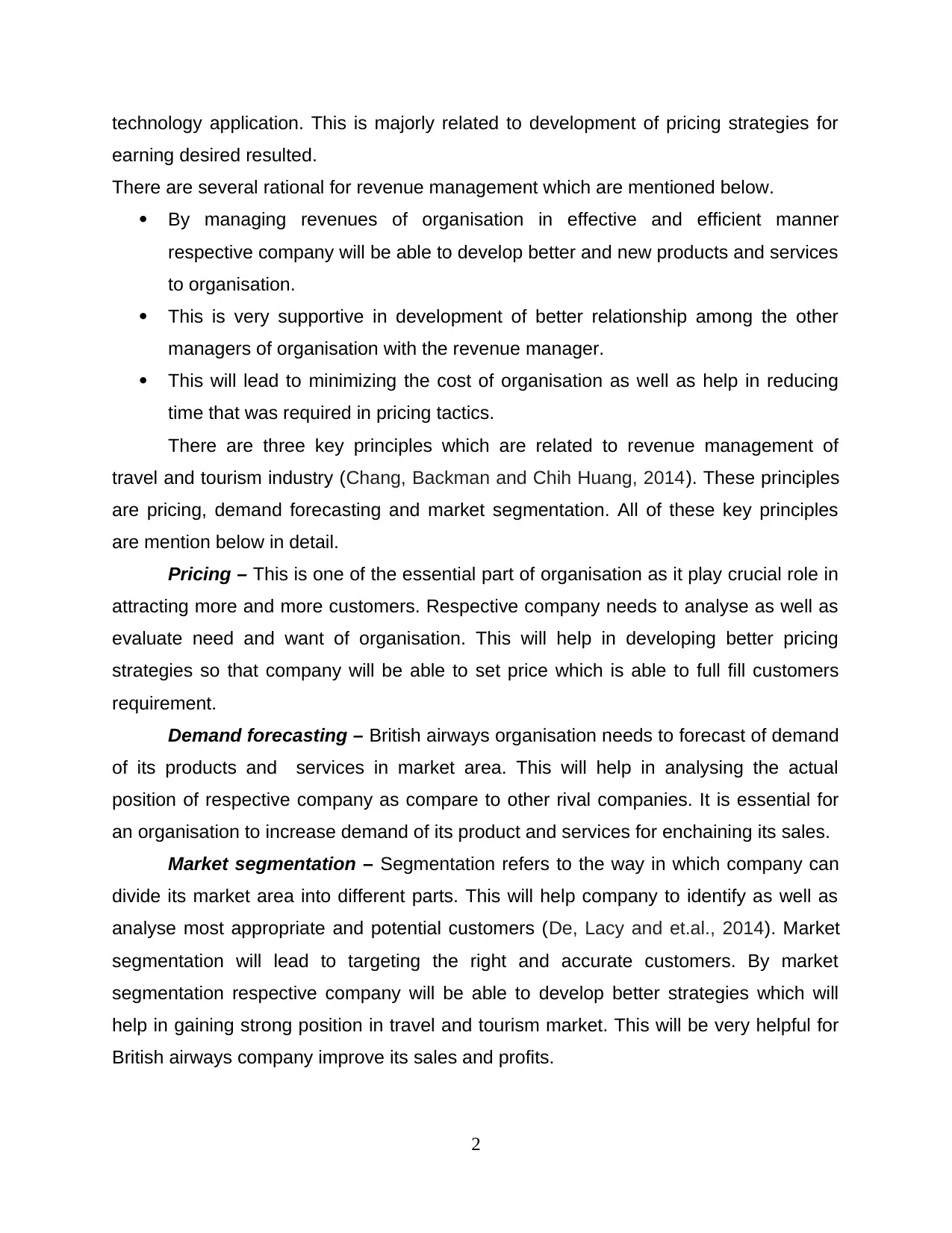
technology application. This is majorly related to development of pricing strategies for
earning desired resulted.
There are several rational for revenue management which are mentioned below.
By managing revenues of organisation in effective and efficient manner
respective company will be able to develop better and new products and services
to organisation.
This is very supportive in development of better relationship among the other
managers of organisation with the revenue manager.
This will lead to minimizing the cost of organisation as well as help in reducing
time that was required in pricing tactics.
There are three key principles which are related to revenue management of
travel and tourism industry (Chang, Backman and Chih Huang, 2014). These principles
are pricing, demand forecasting and market segmentation. All of these key principles
are mention below in detail.
Pricing – This is one of the essential part of organisation as it play crucial role in
attracting more and more customers. Respective company needs to analyse as well as
evaluate need and want of organisation. This will help in developing better pricing
strategies so that company will be able to set price which is able to full fill customers
requirement.
Demand forecasting – British airways organisation needs to forecast of demand
of its products and services in market area. This will help in analysing the actual
position of respective company as compare to other rival companies. It is essential for
an organisation to increase demand of its product and services for enchaining its sales.
Market segmentation – Segmentation refers to the way in which company can
divide its market area into different parts. This will help company to identify as well as
analyse most appropriate and potential customers (De, Lacy and et.al., 2014). Market
segmentation will lead to targeting the right and accurate customers. By market
segmentation respective company will be able to develop better strategies which will
help in gaining strong position in travel and tourism market. This will be very helpful for
British airways company improve its sales and profits.
2
earning desired resulted.
There are several rational for revenue management which are mentioned below.
By managing revenues of organisation in effective and efficient manner
respective company will be able to develop better and new products and services
to organisation.
This is very supportive in development of better relationship among the other
managers of organisation with the revenue manager.
This will lead to minimizing the cost of organisation as well as help in reducing
time that was required in pricing tactics.
There are three key principles which are related to revenue management of
travel and tourism industry (Chang, Backman and Chih Huang, 2014). These principles
are pricing, demand forecasting and market segmentation. All of these key principles
are mention below in detail.
Pricing – This is one of the essential part of organisation as it play crucial role in
attracting more and more customers. Respective company needs to analyse as well as
evaluate need and want of organisation. This will help in developing better pricing
strategies so that company will be able to set price which is able to full fill customers
requirement.
Demand forecasting – British airways organisation needs to forecast of demand
of its products and services in market area. This will help in analysing the actual
position of respective company as compare to other rival companies. It is essential for
an organisation to increase demand of its product and services for enchaining its sales.
Market segmentation – Segmentation refers to the way in which company can
divide its market area into different parts. This will help company to identify as well as
analyse most appropriate and potential customers (De, Lacy and et.al., 2014). Market
segmentation will lead to targeting the right and accurate customers. By market
segmentation respective company will be able to develop better strategies which will
help in gaining strong position in travel and tourism market. This will be very helpful for
British airways company improve its sales and profits.
2
Paraphrase This Document
Need a fresh take? Get an instant paraphrase of this document with our AI Paraphraser
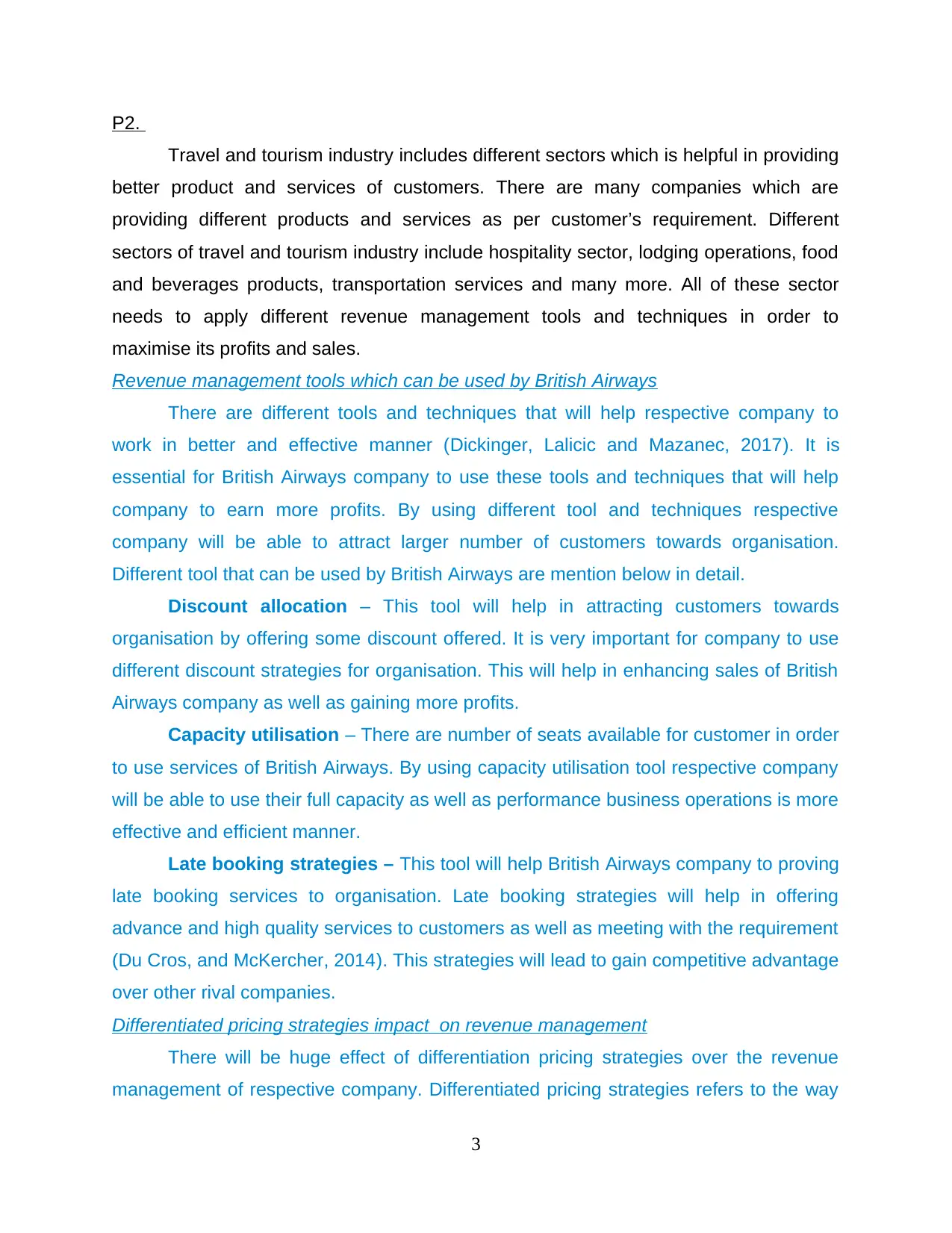
P2.
Travel and tourism industry includes different sectors which is helpful in providing
better product and services of customers. There are many companies which are
providing different products and services as per customer’s requirement. Different
sectors of travel and tourism industry include hospitality sector, lodging operations, food
and beverages products, transportation services and many more. All of these sector
needs to apply different revenue management tools and techniques in order to
maximise its profits and sales.
Revenue management tools which can be used by British Airways
There are different tools and techniques that will help respective company to
work in better and effective manner (Dickinger, Lalicic and Mazanec, 2017). It is
essential for British Airways company to use these tools and techniques that will help
company to earn more profits. By using different tool and techniques respective
company will be able to attract larger number of customers towards organisation.
Different tool that can be used by British Airways are mention below in detail.
Discount allocation – This tool will help in attracting customers towards
organisation by offering some discount offered. It is very important for company to use
different discount strategies for organisation. This will help in enhancing sales of British
Airways company as well as gaining more profits.
Capacity utilisation – There are number of seats available for customer in order
to use services of British Airways. By using capacity utilisation tool respective company
will be able to use their full capacity as well as performance business operations is more
effective and efficient manner.
Late booking strategies – This tool will help British Airways company to proving
late booking services to organisation. Late booking strategies will help in offering
advance and high quality services to customers as well as meeting with the requirement
(Du Cros, and McKercher, 2014). This strategies will lead to gain competitive advantage
over other rival companies.
Differentiated pricing strategies impact on revenue management
There will be huge effect of differentiation pricing strategies over the revenue
management of respective company. Differentiated pricing strategies refers to the way
3
Travel and tourism industry includes different sectors which is helpful in providing
better product and services of customers. There are many companies which are
providing different products and services as per customer’s requirement. Different
sectors of travel and tourism industry include hospitality sector, lodging operations, food
and beverages products, transportation services and many more. All of these sector
needs to apply different revenue management tools and techniques in order to
maximise its profits and sales.
Revenue management tools which can be used by British Airways
There are different tools and techniques that will help respective company to
work in better and effective manner (Dickinger, Lalicic and Mazanec, 2017). It is
essential for British Airways company to use these tools and techniques that will help
company to earn more profits. By using different tool and techniques respective
company will be able to attract larger number of customers towards organisation.
Different tool that can be used by British Airways are mention below in detail.
Discount allocation – This tool will help in attracting customers towards
organisation by offering some discount offered. It is very important for company to use
different discount strategies for organisation. This will help in enhancing sales of British
Airways company as well as gaining more profits.
Capacity utilisation – There are number of seats available for customer in order
to use services of British Airways. By using capacity utilisation tool respective company
will be able to use their full capacity as well as performance business operations is more
effective and efficient manner.
Late booking strategies – This tool will help British Airways company to proving
late booking services to organisation. Late booking strategies will help in offering
advance and high quality services to customers as well as meeting with the requirement
(Du Cros, and McKercher, 2014). This strategies will lead to gain competitive advantage
over other rival companies.
Differentiated pricing strategies impact on revenue management
There will be huge effect of differentiation pricing strategies over the revenue
management of respective company. Differentiated pricing strategies refers to the way
3
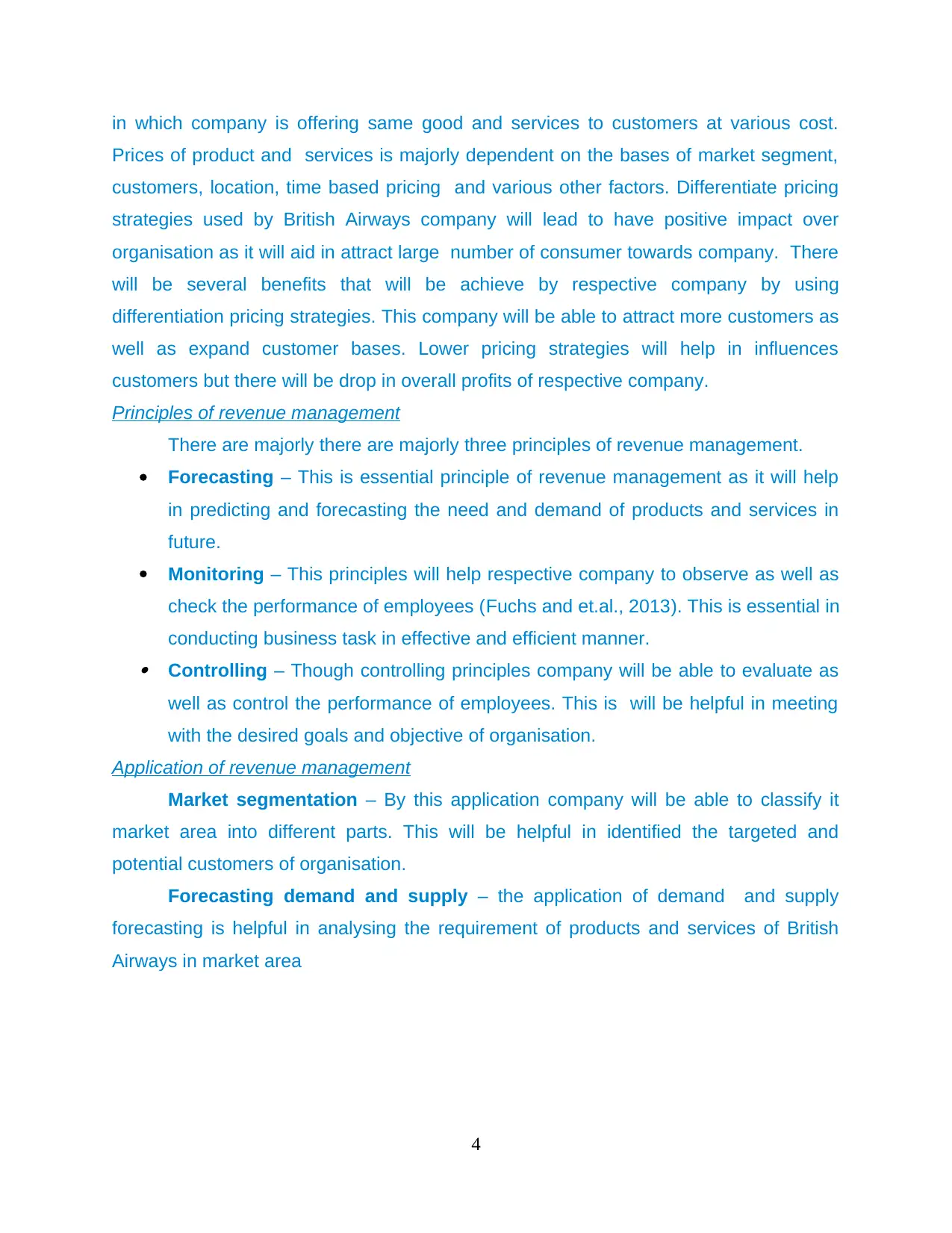
in which company is offering same good and services to customers at various cost.
Prices of product and services is majorly dependent on the bases of market segment,
customers, location, time based pricing and various other factors. Differentiate pricing
strategies used by British Airways company will lead to have positive impact over
organisation as it will aid in attract large number of consumer towards company. There
will be several benefits that will be achieve by respective company by using
differentiation pricing strategies. This company will be able to attract more customers as
well as expand customer bases. Lower pricing strategies will help in influences
customers but there will be drop in overall profits of respective company.
Principles of revenue management
There are majorly there are majorly three principles of revenue management.
Forecasting – This is essential principle of revenue management as it will help
in predicting and forecasting the need and demand of products and services in
future.
Monitoring – This principles will help respective company to observe as well as
check the performance of employees (Fuchs and et.al., 2013). This is essential in
conducting business task in effective and efficient manner. Controlling – Though controlling principles company will be able to evaluate as
well as control the performance of employees. This is will be helpful in meeting
with the desired goals and objective of organisation.
Application of revenue management
Market segmentation – By this application company will be able to classify it
market area into different parts. This will be helpful in identified the targeted and
potential customers of organisation.
Forecasting demand and supply – the application of demand and supply
forecasting is helpful in analysing the requirement of products and services of British
Airways in market area
4
Prices of product and services is majorly dependent on the bases of market segment,
customers, location, time based pricing and various other factors. Differentiate pricing
strategies used by British Airways company will lead to have positive impact over
organisation as it will aid in attract large number of consumer towards company. There
will be several benefits that will be achieve by respective company by using
differentiation pricing strategies. This company will be able to attract more customers as
well as expand customer bases. Lower pricing strategies will help in influences
customers but there will be drop in overall profits of respective company.
Principles of revenue management
There are majorly there are majorly three principles of revenue management.
Forecasting – This is essential principle of revenue management as it will help
in predicting and forecasting the need and demand of products and services in
future.
Monitoring – This principles will help respective company to observe as well as
check the performance of employees (Fuchs and et.al., 2013). This is essential in
conducting business task in effective and efficient manner. Controlling – Though controlling principles company will be able to evaluate as
well as control the performance of employees. This is will be helpful in meeting
with the desired goals and objective of organisation.
Application of revenue management
Market segmentation – By this application company will be able to classify it
market area into different parts. This will be helpful in identified the targeted and
potential customers of organisation.
Forecasting demand and supply – the application of demand and supply
forecasting is helpful in analysing the requirement of products and services of British
Airways in market area
4
⊘ This is a preview!⊘
Do you want full access?
Subscribe today to unlock all pages.

Trusted by 1+ million students worldwide
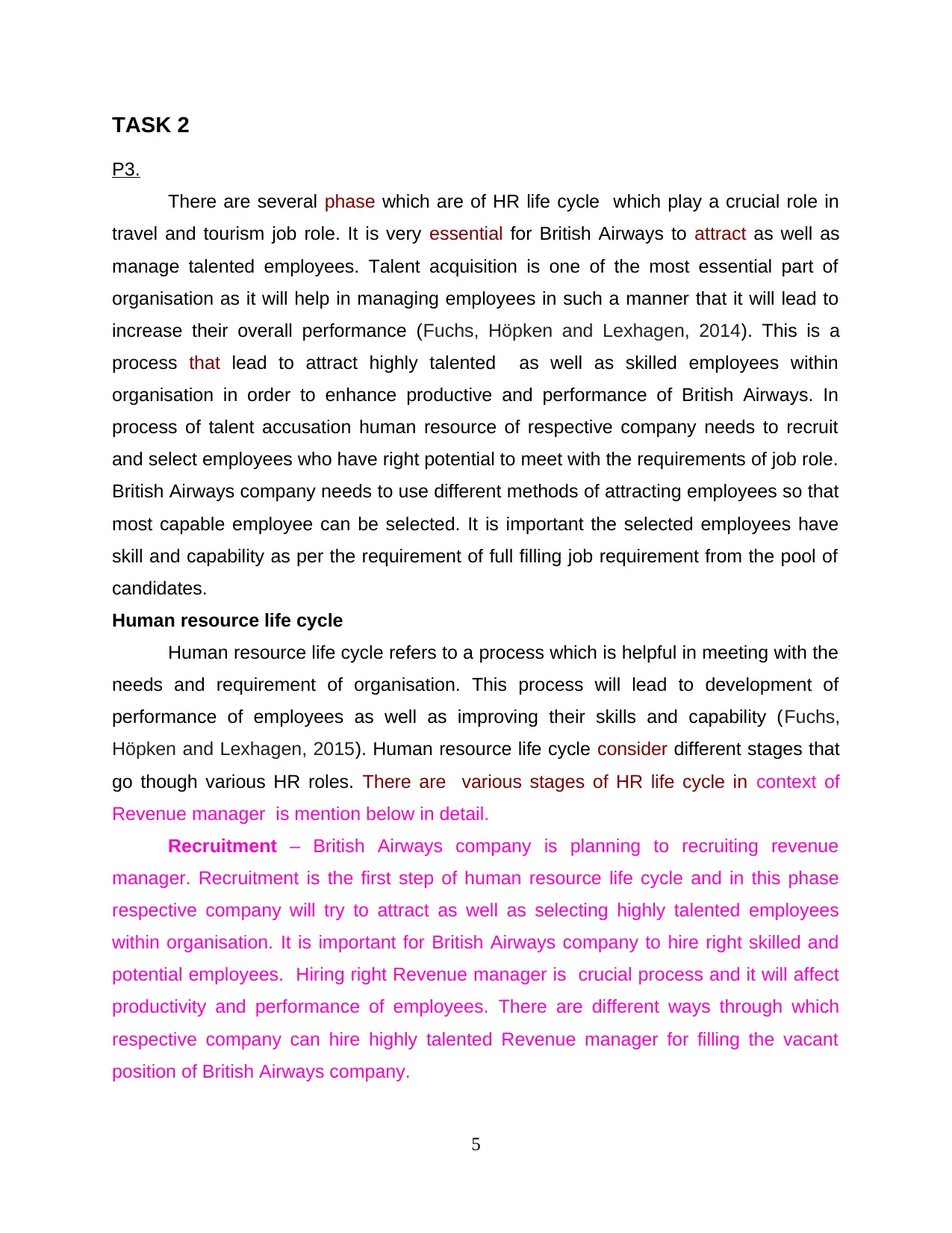
TASK 2
P3.
There are several phase which are of HR life cycle which play a crucial role in
travel and tourism job role. It is very essential for British Airways to attract as well as
manage talented employees. Talent acquisition is one of the most essential part of
organisation as it will help in managing employees in such a manner that it will lead to
increase their overall performance (Fuchs, Höpken and Lexhagen, 2014). This is a
process that lead to attract highly talented as well as skilled employees within
organisation in order to enhance productive and performance of British Airways. In
process of talent accusation human resource of respective company needs to recruit
and select employees who have right potential to meet with the requirements of job role.
British Airways company needs to use different methods of attracting employees so that
most capable employee can be selected. It is important the selected employees have
skill and capability as per the requirement of full filling job requirement from the pool of
candidates.
Human resource life cycle
Human resource life cycle refers to a process which is helpful in meeting with the
needs and requirement of organisation. This process will lead to development of
performance of employees as well as improving their skills and capability (Fuchs,
Höpken and Lexhagen, 2015). Human resource life cycle consider different stages that
go though various HR roles. There are various stages of HR life cycle in context of
Revenue manager is mention below in detail.
Recruitment – British Airways company is planning to recruiting revenue
manager. Recruitment is the first step of human resource life cycle and in this phase
respective company will try to attract as well as selecting highly talented employees
within organisation. It is important for British Airways company to hire right skilled and
potential employees. Hiring right Revenue manager is crucial process and it will affect
productivity and performance of employees. There are different ways through which
respective company can hire highly talented Revenue manager for filling the vacant
position of British Airways company.
5
P3.
There are several phase which are of HR life cycle which play a crucial role in
travel and tourism job role. It is very essential for British Airways to attract as well as
manage talented employees. Talent acquisition is one of the most essential part of
organisation as it will help in managing employees in such a manner that it will lead to
increase their overall performance (Fuchs, Höpken and Lexhagen, 2014). This is a
process that lead to attract highly talented as well as skilled employees within
organisation in order to enhance productive and performance of British Airways. In
process of talent accusation human resource of respective company needs to recruit
and select employees who have right potential to meet with the requirements of job role.
British Airways company needs to use different methods of attracting employees so that
most capable employee can be selected. It is important the selected employees have
skill and capability as per the requirement of full filling job requirement from the pool of
candidates.
Human resource life cycle
Human resource life cycle refers to a process which is helpful in meeting with the
needs and requirement of organisation. This process will lead to development of
performance of employees as well as improving their skills and capability (Fuchs,
Höpken and Lexhagen, 2015). Human resource life cycle consider different stages that
go though various HR roles. There are various stages of HR life cycle in context of
Revenue manager is mention below in detail.
Recruitment – British Airways company is planning to recruiting revenue
manager. Recruitment is the first step of human resource life cycle and in this phase
respective company will try to attract as well as selecting highly talented employees
within organisation. It is important for British Airways company to hire right skilled and
potential employees. Hiring right Revenue manager is crucial process and it will affect
productivity and performance of employees. There are different ways through which
respective company can hire highly talented Revenue manager for filling the vacant
position of British Airways company.
5
Paraphrase This Document
Need a fresh take? Get an instant paraphrase of this document with our AI Paraphraser
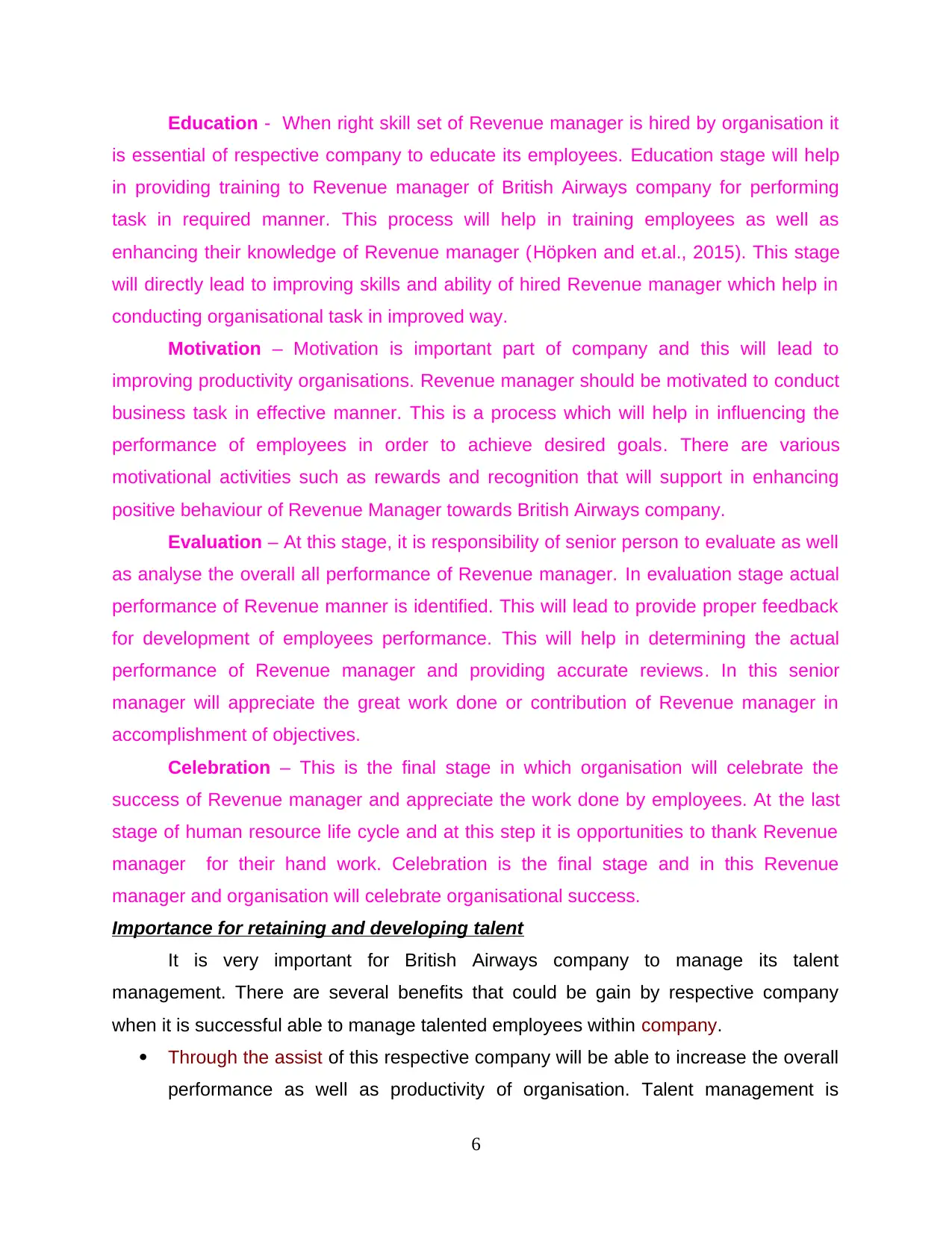
Education - When right skill set of Revenue manager is hired by organisation it
is essential of respective company to educate its employees. Education stage will help
in providing training to Revenue manager of British Airways company for performing
task in required manner. This process will help in training employees as well as
enhancing their knowledge of Revenue manager (Höpken and et.al., 2015). This stage
will directly lead to improving skills and ability of hired Revenue manager which help in
conducting organisational task in improved way.
Motivation – Motivation is important part of company and this will lead to
improving productivity organisations. Revenue manager should be motivated to conduct
business task in effective manner. This is a process which will help in influencing the
performance of employees in order to achieve desired goals. There are various
motivational activities such as rewards and recognition that will support in enhancing
positive behaviour of Revenue Manager towards British Airways company.
Evaluation – At this stage, it is responsibility of senior person to evaluate as well
as analyse the overall all performance of Revenue manager. In evaluation stage actual
performance of Revenue manner is identified. This will lead to provide proper feedback
for development of employees performance. This will help in determining the actual
performance of Revenue manager and providing accurate reviews. In this senior
manager will appreciate the great work done or contribution of Revenue manager in
accomplishment of objectives.
Celebration – This is the final stage in which organisation will celebrate the
success of Revenue manager and appreciate the work done by employees. At the last
stage of human resource life cycle and at this step it is opportunities to thank Revenue
manager for their hand work. Celebration is the final stage and in this Revenue
manager and organisation will celebrate organisational success.
Importance for retaining and developing talent
It is very important for British Airways company to manage its talent
management. There are several benefits that could be gain by respective company
when it is successful able to manage talented employees within company.
Through the assist of this respective company will be able to increase the overall
performance as well as productivity of organisation. Talent management is
6
is essential of respective company to educate its employees. Education stage will help
in providing training to Revenue manager of British Airways company for performing
task in required manner. This process will help in training employees as well as
enhancing their knowledge of Revenue manager (Höpken and et.al., 2015). This stage
will directly lead to improving skills and ability of hired Revenue manager which help in
conducting organisational task in improved way.
Motivation – Motivation is important part of company and this will lead to
improving productivity organisations. Revenue manager should be motivated to conduct
business task in effective manner. This is a process which will help in influencing the
performance of employees in order to achieve desired goals. There are various
motivational activities such as rewards and recognition that will support in enhancing
positive behaviour of Revenue Manager towards British Airways company.
Evaluation – At this stage, it is responsibility of senior person to evaluate as well
as analyse the overall all performance of Revenue manager. In evaluation stage actual
performance of Revenue manner is identified. This will lead to provide proper feedback
for development of employees performance. This will help in determining the actual
performance of Revenue manager and providing accurate reviews. In this senior
manager will appreciate the great work done or contribution of Revenue manager in
accomplishment of objectives.
Celebration – This is the final stage in which organisation will celebrate the
success of Revenue manager and appreciate the work done by employees. At the last
stage of human resource life cycle and at this step it is opportunities to thank Revenue
manager for their hand work. Celebration is the final stage and in this Revenue
manager and organisation will celebrate organisational success.
Importance for retaining and developing talent
It is very important for British Airways company to manage its talent
management. There are several benefits that could be gain by respective company
when it is successful able to manage talented employees within company.
Through the assist of this respective company will be able to increase the overall
performance as well as productivity of organisation. Talent management is
6
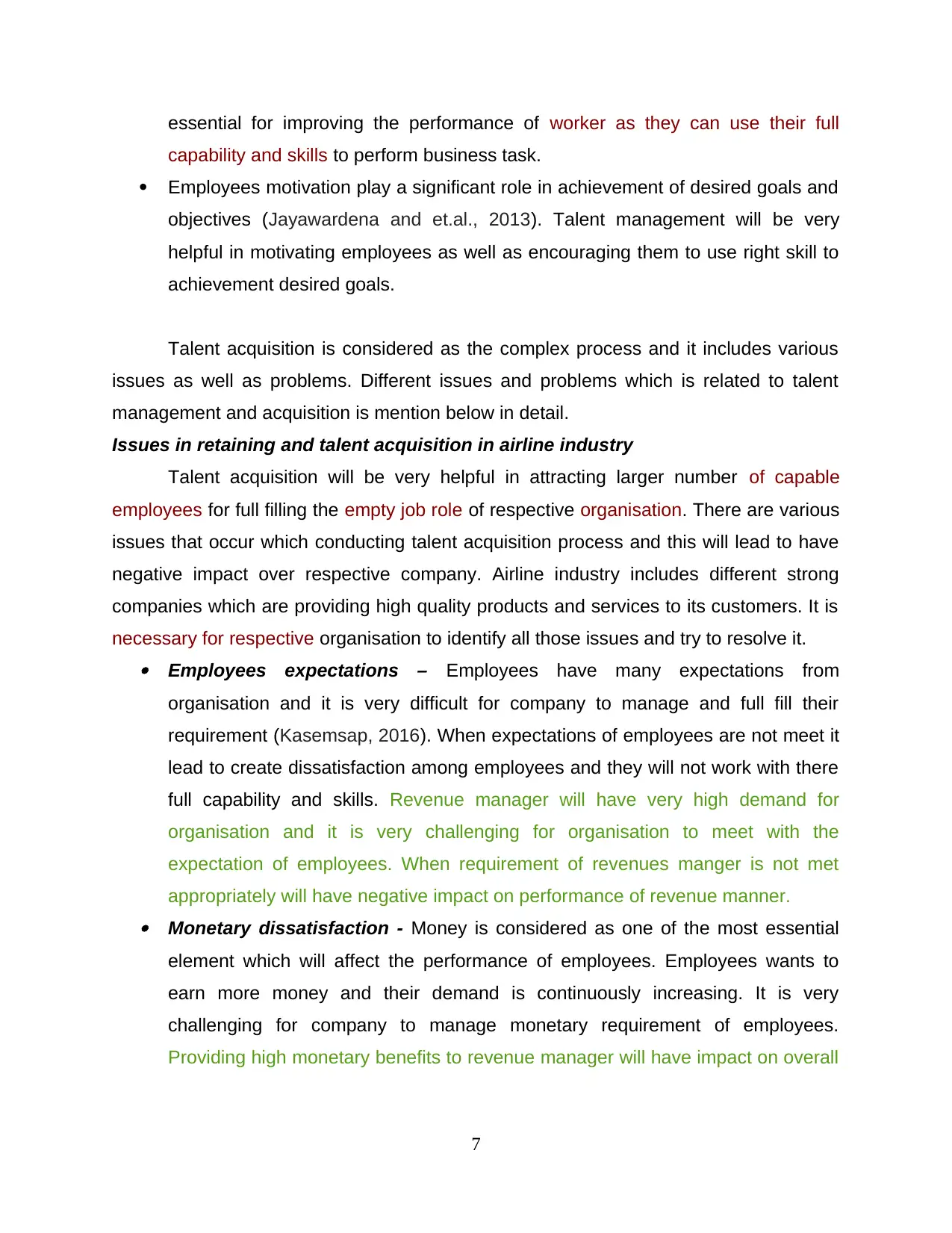
essential for improving the performance of worker as they can use their full
capability and skills to perform business task.
Employees motivation play a significant role in achievement of desired goals and
objectives (Jayawardena and et.al., 2013). Talent management will be very
helpful in motivating employees as well as encouraging them to use right skill to
achievement desired goals.
Talent acquisition is considered as the complex process and it includes various
issues as well as problems. Different issues and problems which is related to talent
management and acquisition is mention below in detail.
Issues in retaining and talent acquisition in airline industry
Talent acquisition will be very helpful in attracting larger number of capable
employees for full filling the empty job role of respective organisation. There are various
issues that occur which conducting talent acquisition process and this will lead to have
negative impact over respective company. Airline industry includes different strong
companies which are providing high quality products and services to its customers. It is
necessary for respective organisation to identify all those issues and try to resolve it. Employees expectations – Employees have many expectations from
organisation and it is very difficult for company to manage and full fill their
requirement (Kasemsap, 2016). When expectations of employees are not meet it
lead to create dissatisfaction among employees and they will not work with there
full capability and skills. Revenue manager will have very high demand for
organisation and it is very challenging for organisation to meet with the
expectation of employees. When requirement of revenues manger is not met
appropriately will have negative impact on performance of revenue manner. Monetary dissatisfaction - Money is considered as one of the most essential
element which will affect the performance of employees. Employees wants to
earn more money and their demand is continuously increasing. It is very
challenging for company to manage monetary requirement of employees.
Providing high monetary benefits to revenue manager will have impact on overall
7
capability and skills to perform business task.
Employees motivation play a significant role in achievement of desired goals and
objectives (Jayawardena and et.al., 2013). Talent management will be very
helpful in motivating employees as well as encouraging them to use right skill to
achievement desired goals.
Talent acquisition is considered as the complex process and it includes various
issues as well as problems. Different issues and problems which is related to talent
management and acquisition is mention below in detail.
Issues in retaining and talent acquisition in airline industry
Talent acquisition will be very helpful in attracting larger number of capable
employees for full filling the empty job role of respective organisation. There are various
issues that occur which conducting talent acquisition process and this will lead to have
negative impact over respective company. Airline industry includes different strong
companies which are providing high quality products and services to its customers. It is
necessary for respective organisation to identify all those issues and try to resolve it. Employees expectations – Employees have many expectations from
organisation and it is very difficult for company to manage and full fill their
requirement (Kasemsap, 2016). When expectations of employees are not meet it
lead to create dissatisfaction among employees and they will not work with there
full capability and skills. Revenue manager will have very high demand for
organisation and it is very challenging for organisation to meet with the
expectation of employees. When requirement of revenues manger is not met
appropriately will have negative impact on performance of revenue manner. Monetary dissatisfaction - Money is considered as one of the most essential
element which will affect the performance of employees. Employees wants to
earn more money and their demand is continuously increasing. It is very
challenging for company to manage monetary requirement of employees.
Providing high monetary benefits to revenue manager will have impact on overall
7
⊘ This is a preview!⊘
Do you want full access?
Subscribe today to unlock all pages.

Trusted by 1+ million students worldwide
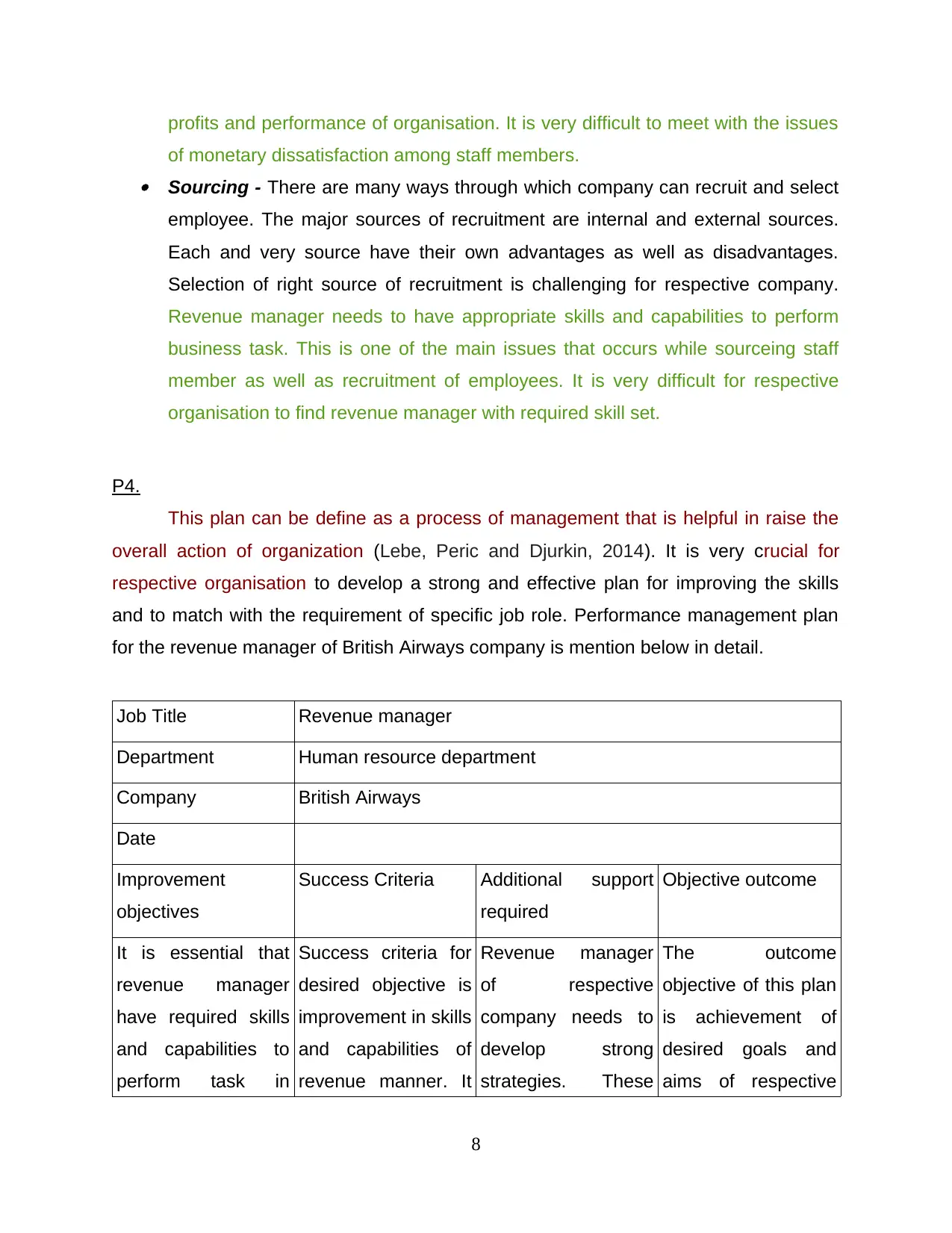
profits and performance of organisation. It is very difficult to meet with the issues
of monetary dissatisfaction among staff members. Sourcing - There are many ways through which company can recruit and select
employee. The major sources of recruitment are internal and external sources.
Each and very source have their own advantages as well as disadvantages.
Selection of right source of recruitment is challenging for respective company.
Revenue manager needs to have appropriate skills and capabilities to perform
business task. This is one of the main issues that occurs while sourceing staff
member as well as recruitment of employees. It is very difficult for respective
organisation to find revenue manager with required skill set.
P4.
This plan can be define as a process of management that is helpful in raise the
overall action of organization (Lebe, Peric and Djurkin, 2014). It is very crucial for
respective organisation to develop a strong and effective plan for improving the skills
and to match with the requirement of specific job role. Performance management plan
for the revenue manager of British Airways company is mention below in detail.
Job Title Revenue manager
Department Human resource department
Company British Airways
Date
Improvement
objectives
Success Criteria Additional support
required
Objective outcome
It is essential that
revenue manager
have required skills
and capabilities to
perform task in
Success criteria for
desired objective is
improvement in skills
and capabilities of
revenue manner. It
Revenue manager
of respective
company needs to
develop strong
strategies. These
The outcome
objective of this plan
is achievement of
desired goals and
aims of respective
8
of monetary dissatisfaction among staff members. Sourcing - There are many ways through which company can recruit and select
employee. The major sources of recruitment are internal and external sources.
Each and very source have their own advantages as well as disadvantages.
Selection of right source of recruitment is challenging for respective company.
Revenue manager needs to have appropriate skills and capabilities to perform
business task. This is one of the main issues that occurs while sourceing staff
member as well as recruitment of employees. It is very difficult for respective
organisation to find revenue manager with required skill set.
P4.
This plan can be define as a process of management that is helpful in raise the
overall action of organization (Lebe, Peric and Djurkin, 2014). It is very crucial for
respective organisation to develop a strong and effective plan for improving the skills
and to match with the requirement of specific job role. Performance management plan
for the revenue manager of British Airways company is mention below in detail.
Job Title Revenue manager
Department Human resource department
Company British Airways
Date
Improvement
objectives
Success Criteria Additional support
required
Objective outcome
It is essential that
revenue manager
have required skills
and capabilities to
perform task in
Success criteria for
desired objective is
improvement in skills
and capabilities of
revenue manner. It
Revenue manager
of respective
company needs to
develop strong
strategies. These
The outcome
objective of this plan
is achievement of
desired goals and
aims of respective
8
Paraphrase This Document
Need a fresh take? Get an instant paraphrase of this document with our AI Paraphraser
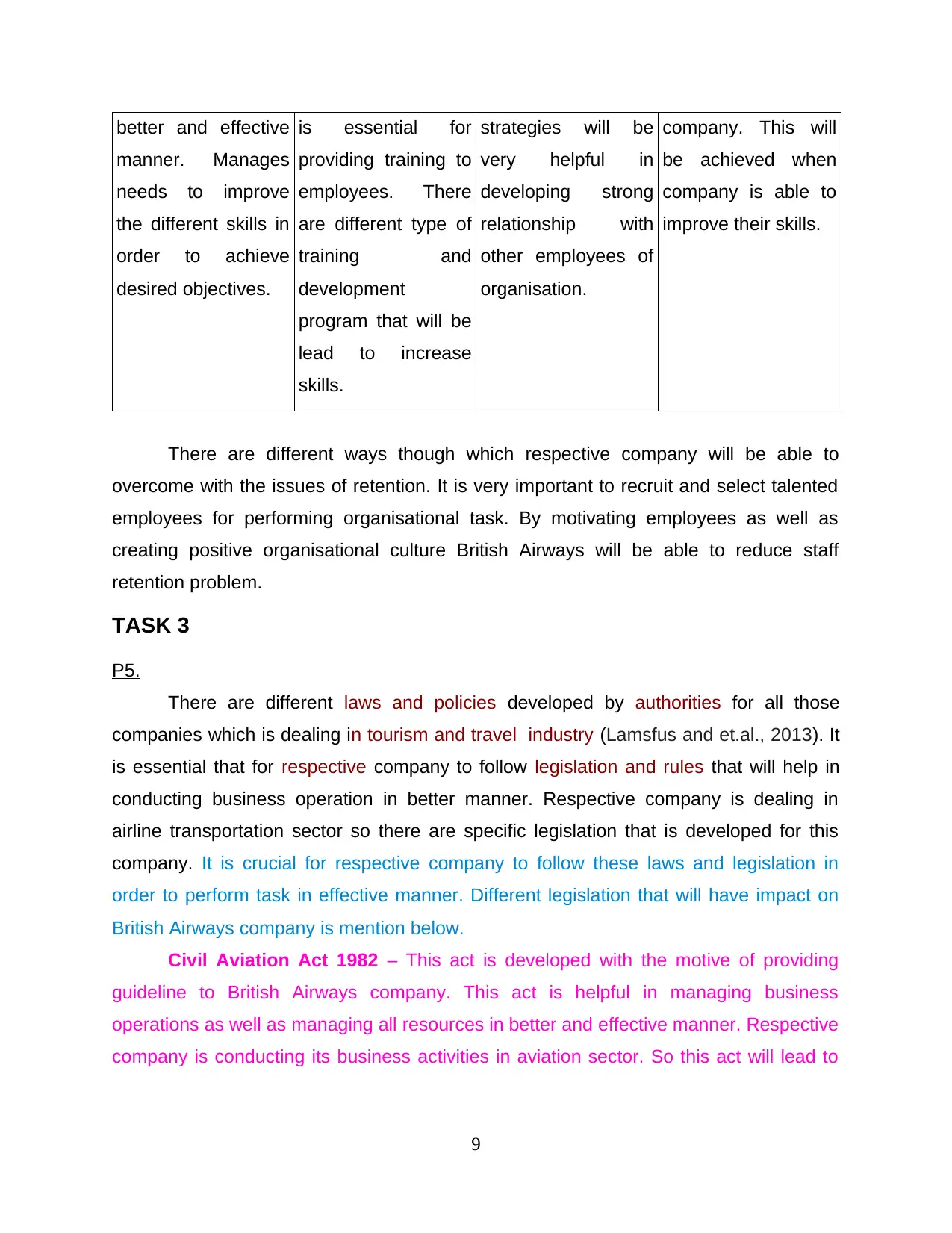
better and effective
manner. Manages
needs to improve
the different skills in
order to achieve
desired objectives.
is essential for
providing training to
employees. There
are different type of
training and
development
program that will be
lead to increase
skills.
strategies will be
very helpful in
developing strong
relationship with
other employees of
organisation.
company. This will
be achieved when
company is able to
improve their skills.
There are different ways though which respective company will be able to
overcome with the issues of retention. It is very important to recruit and select talented
employees for performing organisational task. By motivating employees as well as
creating positive organisational culture British Airways will be able to reduce staff
retention problem.
TASK 3
P5.
There are different laws and policies developed by authorities for all those
companies which is dealing in tourism and travel industry (Lamsfus and et.al., 2013). It
is essential that for respective company to follow legislation and rules that will help in
conducting business operation in better manner. Respective company is dealing in
airline transportation sector so there are specific legislation that is developed for this
company. It is crucial for respective company to follow these laws and legislation in
order to perform task in effective manner. Different legislation that will have impact on
British Airways company is mention below.
Civil Aviation Act 1982 – This act is developed with the motive of providing
guideline to British Airways company. This act is helpful in managing business
operations as well as managing all resources in better and effective manner. Respective
company is conducting its business activities in aviation sector. So this act will lead to
9
manner. Manages
needs to improve
the different skills in
order to achieve
desired objectives.
is essential for
providing training to
employees. There
are different type of
training and
development
program that will be
lead to increase
skills.
strategies will be
very helpful in
developing strong
relationship with
other employees of
organisation.
company. This will
be achieved when
company is able to
improve their skills.
There are different ways though which respective company will be able to
overcome with the issues of retention. It is very important to recruit and select talented
employees for performing organisational task. By motivating employees as well as
creating positive organisational culture British Airways will be able to reduce staff
retention problem.
TASK 3
P5.
There are different laws and policies developed by authorities for all those
companies which is dealing in tourism and travel industry (Lamsfus and et.al., 2013). It
is essential that for respective company to follow legislation and rules that will help in
conducting business operation in better manner. Respective company is dealing in
airline transportation sector so there are specific legislation that is developed for this
company. It is crucial for respective company to follow these laws and legislation in
order to perform task in effective manner. Different legislation that will have impact on
British Airways company is mention below.
Civil Aviation Act 1982 – This act is developed with the motive of providing
guideline to British Airways company. This act is helpful in managing business
operations as well as managing all resources in better and effective manner. Respective
company is conducting its business activities in aviation sector. So this act will lead to
9
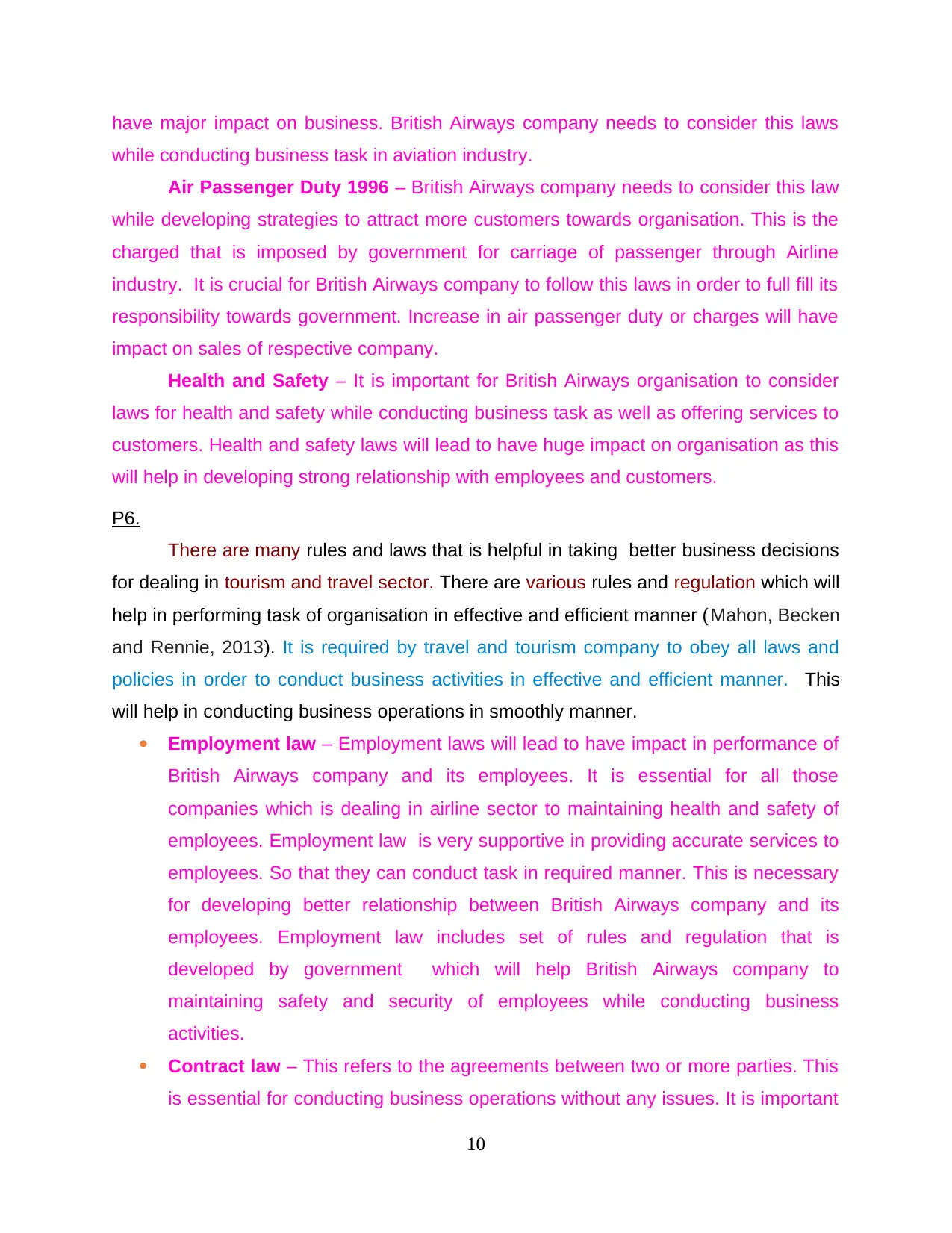
have major impact on business. British Airways company needs to consider this laws
while conducting business task in aviation industry.
Air Passenger Duty 1996 – British Airways company needs to consider this law
while developing strategies to attract more customers towards organisation. This is the
charged that is imposed by government for carriage of passenger through Airline
industry. It is crucial for British Airways company to follow this laws in order to full fill its
responsibility towards government. Increase in air passenger duty or charges will have
impact on sales of respective company.
Health and Safety – It is important for British Airways organisation to consider
laws for health and safety while conducting business task as well as offering services to
customers. Health and safety laws will lead to have huge impact on organisation as this
will help in developing strong relationship with employees and customers.
P6.
There are many rules and laws that is helpful in taking better business decisions
for dealing in tourism and travel sector. There are various rules and regulation which will
help in performing task of organisation in effective and efficient manner (Mahon, Becken
and Rennie, 2013). It is required by travel and tourism company to obey all laws and
policies in order to conduct business activities in effective and efficient manner. This
will help in conducting business operations in smoothly manner.
Employment law – Employment laws will lead to have impact in performance of
British Airways company and its employees. It is essential for all those
companies which is dealing in airline sector to maintaining health and safety of
employees. Employment law is very supportive in providing accurate services to
employees. So that they can conduct task in required manner. This is necessary
for developing better relationship between British Airways company and its
employees. Employment law includes set of rules and regulation that is
developed by government which will help British Airways company to
maintaining safety and security of employees while conducting business
activities.
Contract law – This refers to the agreements between two or more parties. This
is essential for conducting business operations without any issues. It is important
10
while conducting business task in aviation industry.
Air Passenger Duty 1996 – British Airways company needs to consider this law
while developing strategies to attract more customers towards organisation. This is the
charged that is imposed by government for carriage of passenger through Airline
industry. It is crucial for British Airways company to follow this laws in order to full fill its
responsibility towards government. Increase in air passenger duty or charges will have
impact on sales of respective company.
Health and Safety – It is important for British Airways organisation to consider
laws for health and safety while conducting business task as well as offering services to
customers. Health and safety laws will lead to have huge impact on organisation as this
will help in developing strong relationship with employees and customers.
P6.
There are many rules and laws that is helpful in taking better business decisions
for dealing in tourism and travel sector. There are various rules and regulation which will
help in performing task of organisation in effective and efficient manner (Mahon, Becken
and Rennie, 2013). It is required by travel and tourism company to obey all laws and
policies in order to conduct business activities in effective and efficient manner. This
will help in conducting business operations in smoothly manner.
Employment law – Employment laws will lead to have impact in performance of
British Airways company and its employees. It is essential for all those
companies which is dealing in airline sector to maintaining health and safety of
employees. Employment law is very supportive in providing accurate services to
employees. So that they can conduct task in required manner. This is necessary
for developing better relationship between British Airways company and its
employees. Employment law includes set of rules and regulation that is
developed by government which will help British Airways company to
maintaining safety and security of employees while conducting business
activities.
Contract law – This refers to the agreements between two or more parties. This
is essential for conducting business operations without any issues. It is important
10
⊘ This is a preview!⊘
Do you want full access?
Subscribe today to unlock all pages.

Trusted by 1+ million students worldwide
1 out of 19
Related Documents
Your All-in-One AI-Powered Toolkit for Academic Success.
+13062052269
info@desklib.com
Available 24*7 on WhatsApp / Email
![[object Object]](/_next/static/media/star-bottom.7253800d.svg)
Unlock your academic potential
Copyright © 2020–2026 A2Z Services. All Rights Reserved. Developed and managed by ZUCOL.





